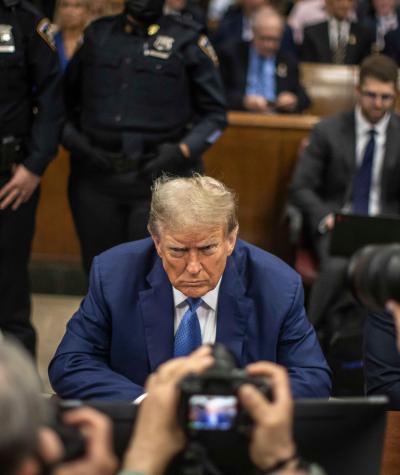Now that the “hush money” trial of former President Donald Trump has come to a close and the jury has returned with its verdict, we’re faced with the fact that for the first time in our history, a major party candidate for president has been convicted of criminal charges.
This news has led to a lot of discussion concerning Trump’s ability to vote for himself in his own election.
That’s because of felony disenfranchisement, a Jim Crow-era practice that takes away someone’s freedom to vote if they have been convicted of a felony.
Nationwide, the practice prevents nearly 5 million Americans from making their voices heard in our elections, disproportionately affecting Black and brown Americans in states across the South.
That includes Florida — where Donald Trump is registered to vote.
Because eligibility to vote is determined by state of residence, and because Trump is a Florida resident and Florida voter, he is subject to the state’s harsh felony disenfranchisement scheme — and he certainly is not the first enter that system.
It is important to note that Florida's system does recognizes voting rights restoration in the state of conviction, and because New York's law states that those with a felony conviction do not lose their right to vote unless they are incarcerated during the election, it is unlikely Trump will lose his right to vote in this case unless he is in prison on Election Day.
Florida prevents more than a million residents from voting because of prior felony convictions coupled with an opaque, cruel policy that keeps people disenfranchised unless they can buy back their freedom to vote by fully paying off often exorbitant fines, fees, and restitution.
Of course, upon completion of any sentence and probation, the former president may not have difficulty paying off fines, fees, costs, or restitution.
However, even for Floridians who have the means to pay off fines, fees, costs, or restitution, there isn’t any centralized database in the state that allows prospective voters to know when they have paid off everything they owe. Often, only those with vast amounts of resources can navigate this system.
Additionally, Florida law provides alternate pathways for restoration, including for those convicted in out-of-state court — as Trump could be. If a Floridian's voting rights are restored in the state of conviction (or they don't lose their right to vote there), they are restored under Florida law. This would not apply to cases in federal courts located in other states, like the January 6 cases in federal court in Washington, DC, however.
Navigating the interaction between these laws can be complicated for a person who can't pay for access to a lawyer, much less one who doesn’t have a team of “white-shoe” attorneys, like Donald Trump. Worse yet, in Florida a wrong conclusion about eligibility could put someone in jeopardy of being prosecuted for a new felony.
Clearly, the complicated relationship between Trump’s case and voting rights highlights how difficult it is for an ordinary person to figure out if they can vote after being convicted of a felony.
This is indicative of one of the larger issues of felony disenfranchisement: It targets voters who often lack resources to navigate the system, including Black and brown voters who are already overrepresented in and disproportionately targeted by the criminal-legal system. This includes an estimated 18 million voters who, because of complicated laws, misinformation, and poor administration, remain de facto disenfranchised.
That’s why we created the RestoreYourVote.org tool, which helps people determine their eligibility to vote.
The tool is part of CLC’s Restore Your Vote campaign, which fights to restore voting rights to people with past convictions by providing direct rights restoration services, empowering community leaders to understand rights restoration laws, and breaking down the false notion that a felony conviction always means you cannot vote.
As part of the Restore Your Vote team’s work, CLC fought Florida’s inequitable felony disenfranchisement scheme, worked alongside local partners to chip away at felony disenfranchisement in Alabama, joined with a coalition to file suit against Louisiana’s unfair felony disenfranchisement policies, and is currently engaged in litigation and policy advocacy against Tennessee’s draconian felony disenfranchisement regime.
Our work is underpinned by the following principle: All Americans deserve the freedom to vote, and no American should ever be robbed of their freedom to make their voice heard in our democracy because of a past felony conviction.
Furthermore, voting and other forms of civic participation are essential to feeling a sense of belonging and acceptance in society. Felony disenfranchisement serves no legitimate purpose within the criminal legal system and actually hinders rehabilitation and reentry. In fact, research shows that rights restoration promotes public safety.
At the end of the day, felony disenfranchisement is unlikely to significantly affect Donald Trump, who has the resources and connections to successfully navigate the system.
But millions of Americans do not have that luxury, and their voice and vote matter just as much. That’s why it’s so important that we continue to fight back against this Jim Crow relic, so that all Americans can exercise their fundamental freedom to vote.

